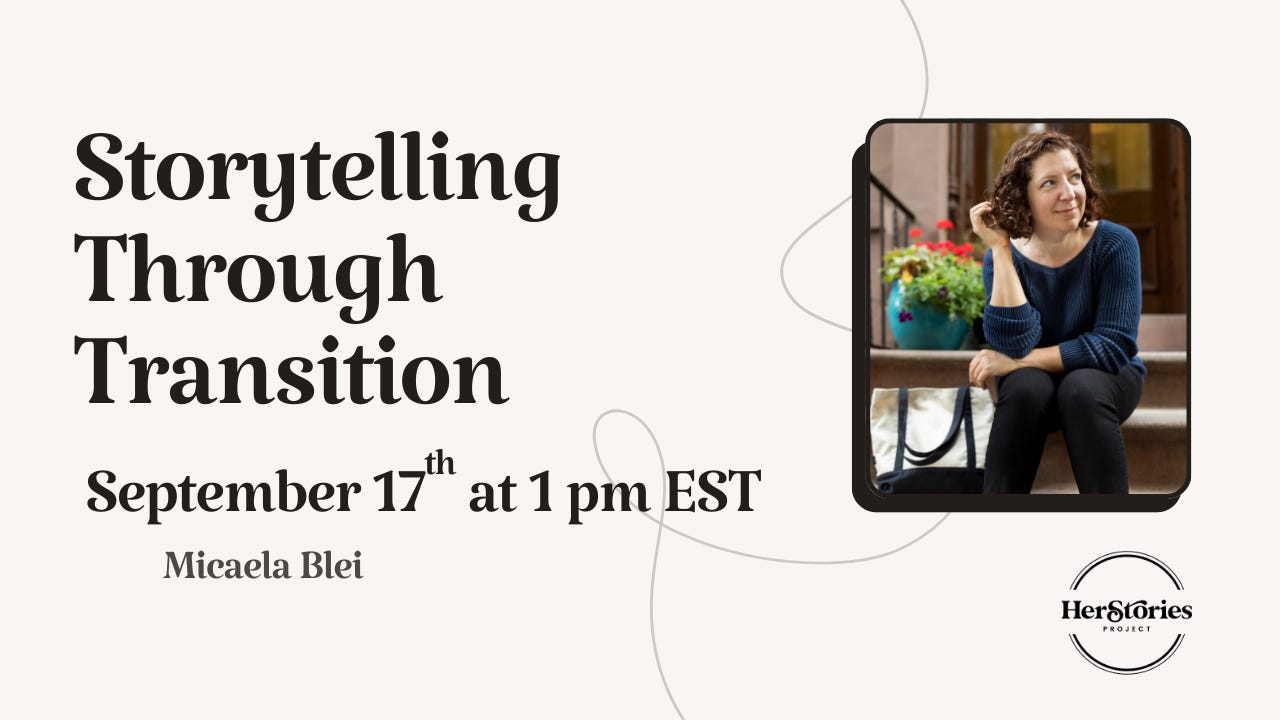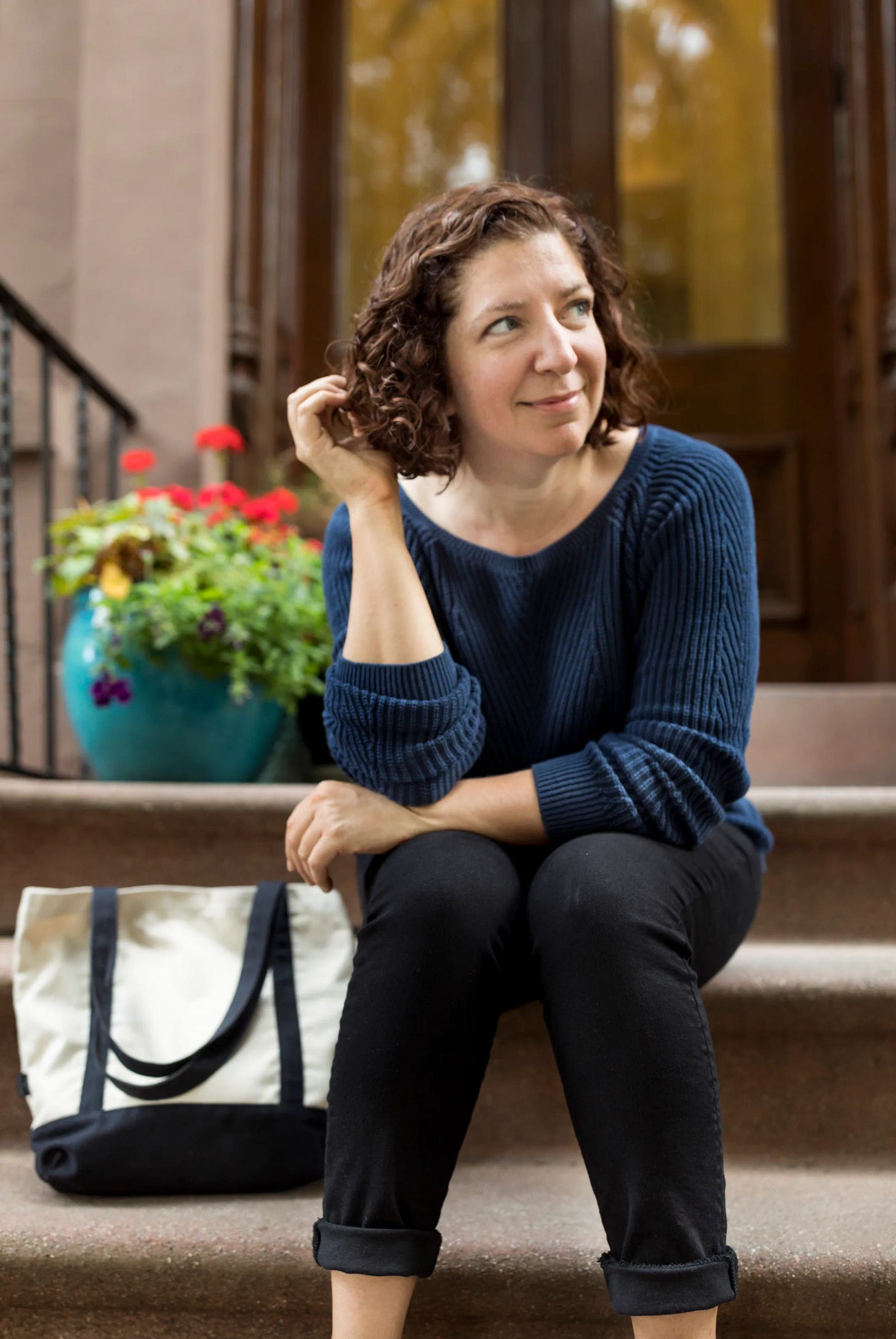Next Wednesday, September 17th at 1 pm EST, we have our first guest instructor workshop of the fall, and I think it strikes the perfect tone for our community of midlife women who write: the significance of storytelling through transition. And Micaela Blei is just the perfect person to guide us through it.
Micaela is a Portland-based storytelling expert, memoir author, and educator who has appeared on This American Life, The Moth Radio Hour, and other major platforms. A two-time Moth GrandSLAM champion and founder of The Moth's Education Program, she developed storytelling curriculum used worldwide and provides workshops for organizations ranging from universities to corporate teams. Her Audible Original memoir "You Will Not Recognize Your Life" became a word-of-mouth hit. She's currently working on her full-length, “coming-of-middle-age” memoir for Harper One.
I had the opportunity to ask Micaela some questions about why storytelling means so much to her, and why it can be so important to midlife women. Her answers kind of blew my mind—read on for some truly mic-drop worthy lines.
Steph: Tell us how you got interested in the topic of storytelling.
Micaela: So I actually got interested in storytelling by accident. I went to a storytelling night with a friend back in 2011, and I had never seen it done before. She wanted me to put my name in the hat for the open mic. I did it just to be supportive. But I got called before I ever heard a personal story performed! So I ended up telling a story on stage without any preparation or context.
I definitely blacked out a little from nerves, but that moment felt genuinely transformative for me. In both the telling AND the listening, I felt connected to people in a way I’d rarely experienced. I’m someone who struggles with social anxiety and connection, and I realized storytelling created this structured way to be vulnerable and connect that felt both safe and powerful.
At that point I was already a classroom teacher and theater educator, so I saw immediately how storytelling could help people connect to each other and reflect on their lives in meaningful ways. That night changed everything for me!
How has storytelling impacted you personally?
Honestly, storytelling completely changed my life's trajectory. It shifted my PhD research to focus on narrative identity, it led me to become the Director of Education at The Moth—it became my life's work.
But on a personal level, storytelling has given me so many essential things. It gives me a framework for reflecting on my life that feels secure and meaningful. It’s a way to make sense of experience without getting overwhelmed by it.
It's also given me a creative outlet that combines my love of performance with my love of creative nonfiction writing. I've never been great at stand-up comedy (I’ve definitely tried!), but storytelling lets me connect with audiences in a way that feels natural. It's given me such a strong instinct for story structure in all genres. And it’s given me access to a writing voice that feels so much more immediate. I’ve adapted my spoken stories into memoir, and that’s been great.
And finally: as a late-diagnosed autistic woman, storytelling has given me a framework for connecting with others that works for my neurodivergent brain. It helps me connect with people and helps them connect with me in a way that's flexible and doesn't depend on typical social cues. It's created space for genuine understanding.
What professional experiences do you have helping women get their stories out there?
I've been helping women tell their stories for almost 15 years. As Director of Education at The Moth, I developed their curriculum for both education and community workshops, and it’s a curriculum that's now used by thousands of people worldwide.
I've worked with a lot of women-centered organizations over the years, including the Girl Scouts, various “boss lady” networks in New York, and the Born This Way Foundation. I also lead a lot of retreat-style workshops that tend to attract women seeking deeper connection and reflection.
What I really specialize in is working with first-time storytellers who are trying to figure out what stories they want to tell and how they want to tell them. And women are often socialized not to take up space, so I love helping women realize that they deserve the mic!
In your opinion, why does storytelling matter during an era when it seems like the whole world is on fire? Do our personal stories still matter?
The short answer is yes. Our personal stories matter more than ever when the world feels overwhelming. I mean, we need each other right now. And stories help us find each other. Finding pockets of community and joy feels really essential.
I also think of personal storytelling as a filter for experience. We're drowning in information.
Just like our brains filter visual input so we can function, storytelling helps us find a thread through our experiences. It keeps us from feeling completely overwhelmed by the constant input.
And in terms of what's going on in the world: it's really hard to understand the scale of global events. When we're talking about worldwide crises, our brains can't necessarily comprehend numbers that large. But we can connect to individual people and individual stories. Personal narratives help us feel and understand the real impact of what's happening, even when the scale is too big to grasp intellectually. So LISTENING to stories is just as important as telling them.
In a time when things feel so abstract and overwhelming, personal stories can ground us in what's real and human.
Why do you think it's important for midlife women in particular to get their stories out into the world, whatever that looks like?
There are two critical reasons. First, there's this moment when we start to feel invisible. Whether it’s because our roles are now in service of other people (children, partners, aging parents), or because society no longer sees us the way it did when we were younger. Telling our stories asserts that we exist in the world. It's about reclaiming visibility on our own terms.
Second, midlife for women is like a second puberty, right? I’ve heard that said. So we're going through enormous changes: perimenopause, menopause, shifting roles, changing identity. Storytelling helps us organize these experiences and navigate those changes with our own voices.
Being able to reflect on where we've been and where we want to go helps us make sense of this moment of upheaval. It helps us feel like we're agents in our own lives, not just trying to manage changes that are happening TO us.
We get to be the authors of our own transformation!
How can storytelling have a positive impact on our wellbeing at this stage of our lives?
I see storytelling as inherently a community act. When we tell stories in groups, we realize we're not alone in what we're experiencing. That’s one powerful way we can impact our own well-being: to be less alone in our experience.
And related to that, storytelling also makes these life changes more visible and normalized. As far as I can tell, previous generations of women didn't really talk openly about menopause, perimenopause, or what it's actually like to age. They seemed to only talk about anti-aging creams and hiding the process.
So sharing stories about change and this moment in our lives makes these experiences more public and visible. That's important for us as individuals, but it's also important for the women coming after us. We're creating a different conversation about what it means to be a woman moving through these life stages.
Is there anything you want readers to know about what to expect from your workshop on 9/17?
Just get ready to have a lot of fun! This isn't going to be intimidating or performative; you won't be asked to do anything you don't want to do. But you will have opportunities to discover your own stories in a completely supportive environment.
Bring a notebook and your curiosity. You don’t need a story idea to join! You’ll leave with practical tools you can use long after the workshop, plus some genuine insights about your own experiences. I love creating spaces where women can explore their stories without pressure, and I can't wait to see what emerges when we're all together.
Isn’t she amazing?? You can learn more about Micaela on her website, and I hope you’ll join us next Wednesday the 17th at 1 pm EST/ 10 am PST!
Freewriting Circle 9/18
Want to do some community freewriting—for free? Join us for an hour-long writing circle with prompts, connection, visualization, and sharing. This is free for our entire community, so all you need to do is register with your email to get the Zoom link to join us on Thursday, September 18th at 1 pm EST / 10 am PST.
XO,
Steph




